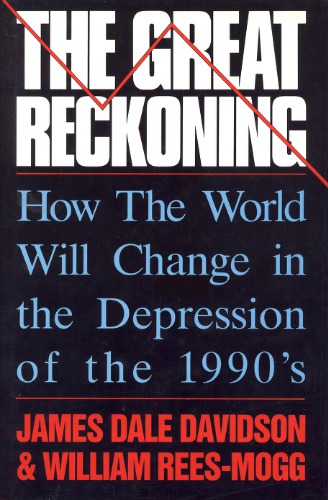You are here
The Great Reckoning: How the World will Change in the Depression of the 1990s (1991)
Primary tabs
| Size | Seeds | Peers | Completed |
|---|---|---|---|
| 5.49 MiB | 1 | 0 | 130 |
 .
.
In Blood in the Streets and in the first edition of The Great Reckoning, James Dale Davidson and Lord William Rees-Mogg have proven to be most accurate forecasters. They foresaw the 1987 crash of the Wall Street stock market, the real estate bust, the downfall of Communism, the trouble with the S&Ls, and Tokyo's stock market crash.
Now in this revised and updated edition of The Great Reckoning, among hundreds of predictions, they foresee that the rest of the 1990s will be even more difficult, with the bankruptcy of the welfare state; the breakup of many large institutions, including a number of nation-states; greater decline in real estate prices; debt implosion; and the insolvency of many consumers and corporations.
The Great Reckoning analyzes an event that is yet to happen - the final depression of the twentieth century. "The postwar world as we have known it since 1945 is coming to an end," write Davidson and Rees-Mogg. They believe that the rest of the decade will usher in a revolution in the organization of human affairs that will alter all our lives. More than at any time since the end of World War II, we are vulnerable to financial, economic, and political upheaval. Davidson and Rees-Mogg, who predicted the current recession, have now devised a plan for thriving in difficult times.
Looking into the future - politically, socially, financially - they make assumptions about the next ten years and devise a strategy for success. As they did in their previous book, Blood in the Streets, Davidson and Rees-Mogg show you how to prosper in lean times. From a directory that ranks the best American places to live, to a listing of both troubled and sound banks, to predictions of which businesses will flourish and which will struggle, The Great Reckoning includes indispensable information for surviving and prospering in a decade of economic crisis.
- Log in to post comments
